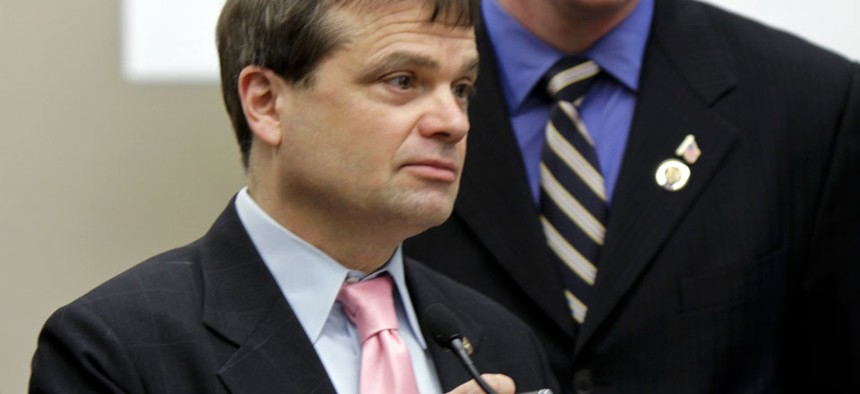
Rep. Mike Quigley, D-Ill. Rep. Darrell Issa, R-Calif.
Wide-Ranging Bill Seeks to Shine More Light on Lobbying and Regulatory Process
Legislation also would toughen financial disclosure rules for members of Congress and judges as well as improve public access to government documents.
A grab-bag transparency bill introduced March 13 would use technology to boost public oversight of program spending, standardize agency reporting on use of the Freedom of Information Act, shed greater light on lobbying and add new requirements for judges to disclose financial investments.
The Transparency in Government Act would also toughen online disclosure requirements for lawmakers’ personal finances, office expenses, gift reports and foreign travel.
“The public’s trust in government has reached historic lows, causing many Americans to simply give up on Washington,” said Rep. Mike Quigley, D-Ill., who introduced legislation just in time for Sunshine Week this week. “But the mission of government matters, and we can’t lead in the face of this deficit of trust. The Transparency in Government Act shines a light on every branch of the federal government, strengthening our democracy and promoting an efficient, effective and open government.”
The bill contains provisions that would:
- require agencies to put all completed FOIA requests online in a format that is searchable, sortable and downloadable while tracking requests on FOIA Online;
- improve the public’s access to White House and agency leaders’ visitor logs;
- expand the data available on USAspending.gov to include information about leases and congressional earmarks, while establishing an online database to collect and publish data on lobbying by federal contractors;
- establish new definitions for lobbyists and stricter rules governing how and with whom they meet;
- require the Clerk of the House to publish vote records online in an easily searchable, structured data format, and require members to include their individual vote record on congressional websites;
- direct congressional committees to post public hearings and markup schedules, related bill language, witness testimony, and audio and video recordings online; and
- mandate audio recording of oral arguments and live-streaming of the recordings on the Supreme Court’s website.
The bill has drawn support from Citizens for Responsibility and Ethics in Washington, the Sunlight Foundation, the Data Transparency Coalition, the Project on Government Oversight and the Electronic Privacy Information Center.
Advocacy groups were particularly interested in the bill’s provisions to require the White House Office of Information and Regulatory Affairs to post online drafts showing changes the office makes to rules proposed by agency regulators. Another key provision would broaden the requirements for Congress and agency executive financial disclosure in the 2012 Stop Trading on Congressional Knowledge (STOCK) Act to require more information from members of the judiciary. The bill would require the Government Accountability Office to monitor compliance with the law, if enacted.
“We believe that this bill contains several inventive ideas and commonsense reforms and deserves a full examination by Congress,” wrote Leslie Haymon in a blogpost for the Center for Effective Government. “Many of these proposals close loopholes that have hampered transparency and shore up open government principles that form the bedrock of an accountable government.”







